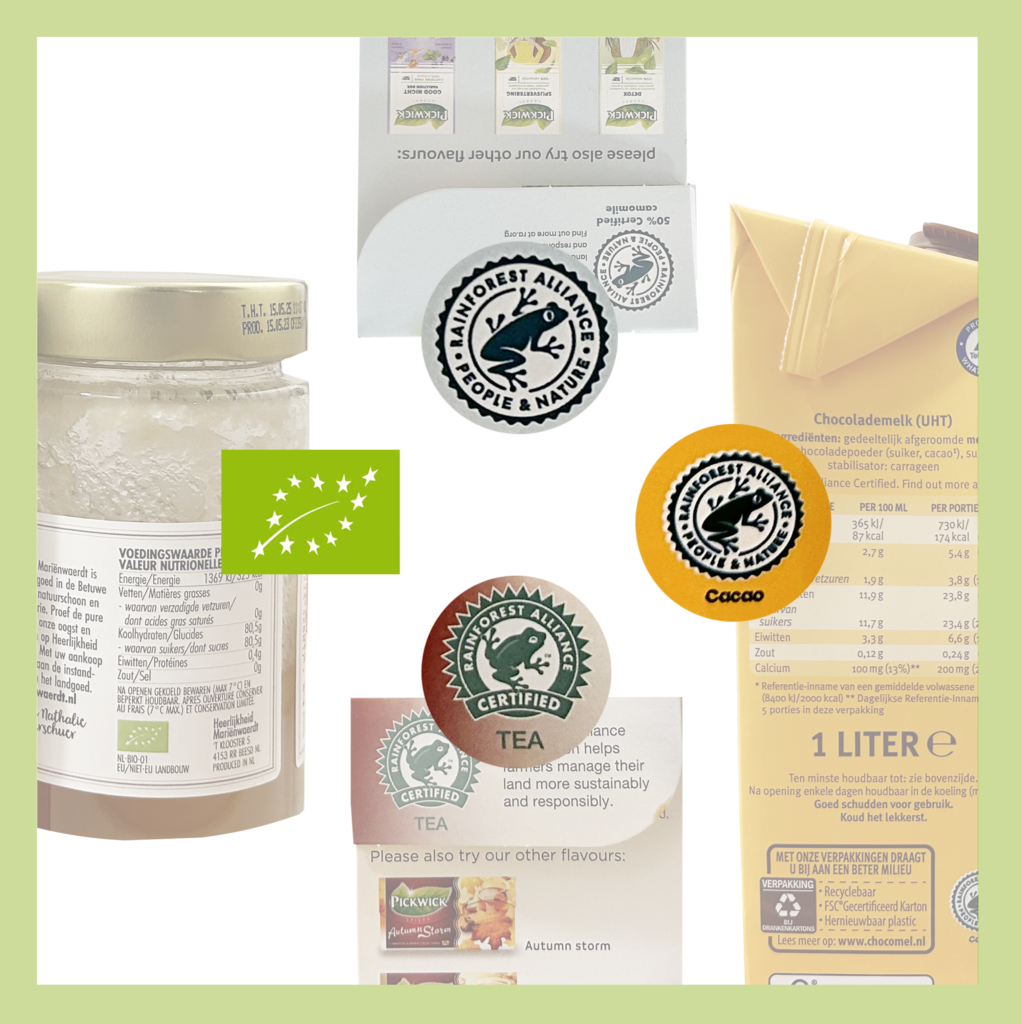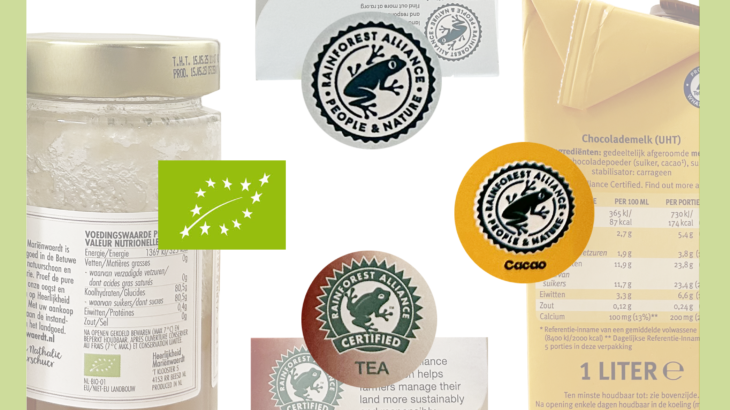Truly Sustainable: ‘Ecolabels’ that provide the proof
#greenwashing blog series

If given a choice between an organically produced food product and a non-organic option, how many of us would choose the organic one? If you are among those who would choose the organic option, how do you know if a particular food product is organic? Suppose you rely only on the product’s name to determine its organic origin, can you be certain that the product has been produced organically without pesticides or artificial chemicals?
One of the ways to be sure is to look for the official ‘organic logo’ on the product. If you are in the US, you would look for the ‘USDA Organic’ logo to establish the certainty of organically producing the product. In Europe, we look for the official EU logo with a green background and white stars arranged in a leaf shape. These logos can be used only on a product if certified as organic by the USDA and EU-regulated national bodies. On similar lines, many products in the markets carry logos indicating their sustainability, usually issued by a non-governmental organization.
Since people worldwide became aware of industries’ impact on our one and only planet, big and small companies and global corporations have come under immense pressure to reduce their environmental footprint. This pressure is driven by changing consumer preferences: more and more people choose products with an environmentally friendly life-cycle. Consumer products started coming with labels such as ‘eco-friendly’, ‘green’ or ‘sustainable’ to attract more sales.
However, some brands are also known to greenwash their customers with misleading claims of sustainability. Unfortunately, to curb this, we do not have any universally accepted sustainability standards so far. Numerous third-party organizations, with extensive research and input from experts and stakeholders, have come up with voluntary sustainability certifications (or ‘ecolabels’ as they are popularly called) that provide an assurance of product sustainability to consumers.
A brief history
Historically, countries have gone to war for ‘free trade’ rights. In ancient times, bigger, stronger empires would conquer smaller territories to impose ‘free trade’ on them. Gradually, this ‘acquiring’ of trading rights became territorial expansion for the powerful states. We know this phenomenon as ‘colonization’ from the history pages of the medieval and early modern ages. The power dynamics between the ‘conqueror’ state and the ‘conquered’ one caused the exploitation of people in the conquered regions in favour of trade profits earned by the conqueror.
Fast forward to the post-war world, when all countries started opening up for trade, a similar trade pattern emerged. Countries of the Global South started producing cheap goods to be consumed by those in the Global North. While this was believed to improve the economic conditions of worker communities in developing countries, it instead paved the way for their exploitation. The most significant of these cases is that of ‘sweatshops’ in Bangladesh: small enclosed workplaces with poor hygienic conditions and overcrowding of workers who worked overtime at unfair wages to meet the consumer demands of the capitalist world. This raised questions about the ethical practices of businesses involved in production and global trade.
In the 1980s and 1990s, the world started debating about sustainability and the effect of commercial production on the environment and society. The idea of sustainable development by ensuring economic growth along with environmental protection and social well-being started gaining more attention internationally. As big corporations and companies started coming under the microscope for their environmental and social footprint, they began taking steps to reduce it. Global awareness and pressure from investors forced them to provide evidence of the sustainability of their business practices. With a lack of strong legislation, the absence of universally accepted standards and increasing consumer demand, third-party certifications appeared as a solution to this problem.
What are these third-party sustainability certifications?
Sustainability certifications or labels, popularly known as ‘ecolabels’, are voluntary certifications issued by a third party that can be obtained by a company for its products or business practices to ensure its customers of their sustainability. These certifications are issued only when the company meets the issuer’s criteria. Some have very strict and stringent criteria, including vetting and even on-site verification of the company’s business processes. These certificates are voluntary, meaning the company has a choice if it wants to obtain them. No legislation makes them mandatory.
Since independent non-governmental organizations often issue certificates, there are over 300 such labels available for different products such as apparel, electronics, food products, product materials, etc. Some certifications are also awarded based on business practices (e.g. raw material procurement, production, trade practices, etc.) or even for companies as a whole (for example, the b-Corp label). They cover safeguards for environmental pollution, biodiversity & conservation, animal welfare, carbon emissions, social & ethical issues, trade practices and overall sustainability of business and production.
To obtain a certificate, a company has to apply for it. Since numerous certificates are available for a single product type, the choice of the certificate depends on the product and its target consumers. The issuing organization then verifies all the information and data the company provides regarding its production process. The certificate in question is issued only when the company meets the standards laid down by the issuing organization. Then, the company can display the certificate’s official logo on its products, websites and other marketing platforms.
The role of ‘ecolabels’
Some of these certificates are incredibly well-respected and trusted by the consumers. The logo displayed on products or advertising platforms makes them easy to spot. Certification also equally builds trust among consumers and investors, making it suitable for the company. It shows that the company is transparent with its processes and is mindful of its social and environmental footprints. This also shows business responsibility and accountability from the company’s side. It is proof that the company is following sustainable practices.
This labelling is presumed to drive consumer behaviour towards making sustainable choices, which is a key aspect in achieving a circular economy and sustainability transition. However, with the number of certificates available in the market, it leaves one to wonder which one of them is the better one. What counts here is the transparency of the face sitting behind the issuing authority or the basis on which the certificate is issued. While ecolabels can be an instrumental tool in sustainability transitions, we need universally accepted standards to accelerate the potential change they can bring.
…………………..
Writen by Saee Ghule
Edited by Intan Pamungkas
……
References:
- Directorate-General for Agriculture and Rural Development. 2018. “The Organic Logo.” European Commission. November 20, 2018. https://agriculture.ec.europa.eu/farming/organic-farming/organic-logo_en.
- EUROPEAN STUDENT THINK TANK. 2016. “Free Trade Agreements – A Brief History.” EUROPEAN STUDENT THINK TANK. June 14, 2016. https://esthinktank.com/2016/06/14/free-trade-agreements-a-brief-history/.
- Indeed Editorial Team. 2023. “10 Different Sustainability Certifications to Consider.” Indeed. February 21, 2023. https://uk.indeed.com/career-advice/career-development/sustainability-certification.
- KPMG. 2023. “Sustainability Standards and Labels.”
- Meis-Harris, Julia, Celine Klemm, Stefan Kaufman, Jim Curtis, Kim Borg, and Peter Bragge. 2021. “What Is the Role of Eco-Labels for a Circular Economy? A Rapid Review of the Literature.” Journal of Cleaner Production 306 (July): 127134. https://doi.org/10.1016/j.jclepro.2021.127134.
- Saurab Babu. 2020. “A Brief History of Ecolabels and Sustainability Standards.” ECO-INTELLIGENTTM. April 7, 2020. https://eco-intelligent.com/2020/04/07/history-ecolabels-and-sustainability-standards/comment-page-1/.
- Ugreen. 2024. “Navigating the Sustainable Certification Process: A Step-by-Step Guide.” Ugreen. January 8, 2024. https://ugreen.io/navigating-the-sustainable-certification-process-a-step-by-step-guide/.
- Ultan O’Callaghan. 2024. “8 Sustainability Certifications You Need To Know (2024).” Thooja. January 23, 2024. 1. https://www.thooja.com/blog/sustainability-certification.
